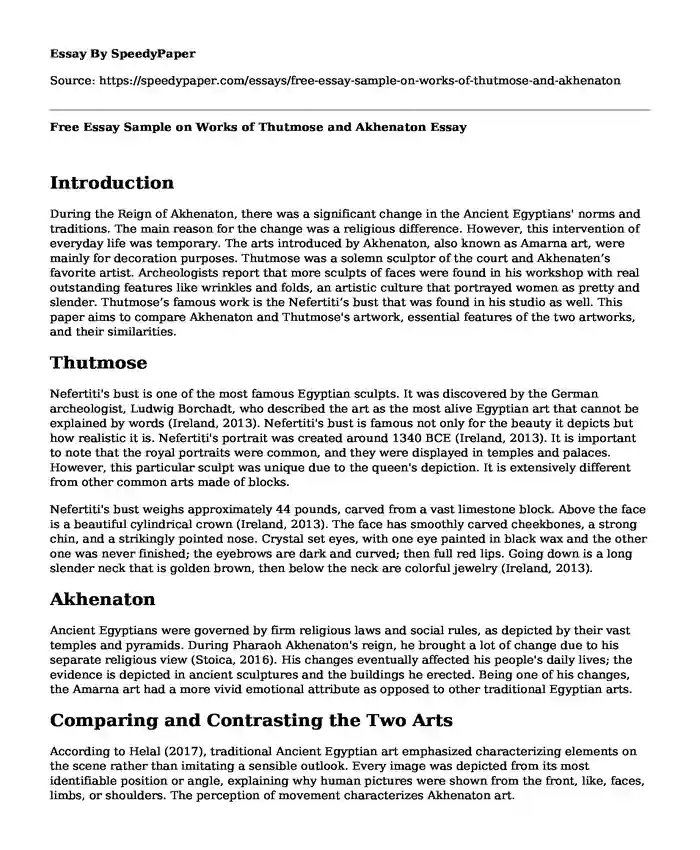
| Type of paper: | Essay |
| Categories: | Religion Art Ancient history |
| Pages: | 3 |
| Wordcount: | 807 words |
Introduction
During the Reign of Akhenaton, there was a significant change in the Ancient Egyptians' norms and traditions. The main reason for the change was a religious difference. However, this intervention of everyday life was temporary. The arts introduced by Akhenaton, also known as Amarna art, were mainly for decoration purposes. Thutmose was a solemn sculptor of the court and Akhenaten’s favorite artist. Archeologists report that more sculpts of faces were found in his workshop with real outstanding features like wrinkles and folds, an artistic culture that portrayed women as pretty and slender. Thutmose’s famous work is the Nefertiti’s bust that was found in his studio as well. This paper aims to compare Akhenaton and Thutmose's artwork, essential features of the two artworks, and their similarities.
Thutmose
Nefertiti's bust is one of the most famous Egyptian sculpts. It was discovered by the German archeologist, Ludwig Borchadt, who described the art as the most alive Egyptian art that cannot be explained by words (Ireland, 2013). Nefertiti's bust is famous not only for the beauty it depicts but how realistic it is. Nefertiti's portrait was created around 1340 BCE (Ireland, 2013). It is important to note that the royal portraits were common, and they were displayed in temples and palaces. However, this particular sculpt was unique due to the queen's depiction. It is extensively different from other common arts made of blocks.
Nefertiti's bust weighs approximately 44 pounds, carved from a vast limestone block. Above the face is a beautiful cylindrical crown (Ireland, 2013). The face has smoothly carved cheekbones, a strong chin, and a strikingly pointed nose. Crystal set eyes, with one eye painted in black wax and the other one was never finished; the eyebrows are dark and curved; then full red lips. Going down is a long slender neck that is golden brown, then below the neck are colorful jewelry (Ireland, 2013).
Akhenaton
Ancient Egyptians were governed by firm religious laws and social rules, as depicted by their vast temples and pyramids. During Pharaoh Akhenaton's reign, he brought a lot of change due to his separate religious view (Stoica, 2016). His changes eventually affected his people's daily lives; the evidence is depicted in ancient sculptures and the buildings he erected. Being one of his changes, the Amarna art had a more vivid emotional attribute as opposed to other traditional Egyptian arts.
Comparing and Contrasting the Two Arts
According to Helal (2017), traditional Ancient Egyptian art emphasized characterizing elements on the scene rather than imitating a sensible outlook. Every image was depicted from its most identifiable position or angle, explaining why human pictures were shown from the front, like, faces, limbs, or shoulders. The perception of movement characterizes Akhenaton art.
This type of art human images portrayed imperfections, probably with respect to Aton Religion. The sculptures represented long necks, pronounced facial wrinkles, big ears, protruding chins, narrow eyes to show emotion. The images' body consisted of long thin necks, weak shoulders, big thighs, and skinny legs (Stoica, 2016). Skin tone is another distinguishing feature in Akhenaton art; human images had darker skin instead of red skin as in the conventional arts. The distinction in art resulted in differences in themes. The royal family's portrait with the sun rays over them was a typical art, and the religious aspect was ignored. The family was portrayed as close; the royal family was shown as a happy close family with the king kissing his son and the wife carrying other kids on her thighs (Helal, 2017).
Thutmose's art was exquisite, it was designed just for the eyes to see, he never took it out for display, and Akhenaton’s art, on the other hand, was used to decorate the temples of Aton and memorials for his rule. Another difference is; Thutmose’s art was a masterpiece representation of feminine beauty that may have been exaggerated, while Akhenaton's art was a representation of reality; this art portrayed human more clearly with features vividly distinguished, as well as imperfections. Nefertiti’s bust was painted golden brown while the Amarna arts were painted darker. The two artworks' primary similarity is that they both are ancient Egyptian arts, and both are dated around the same period when Akhenaton was the Pharaoh.
Conclusion
In conclusion, even though the Amarna art was short-lived, it is reported as a more reasonable style, and artisans have preserved some distinguishing features. Thutmose's work however, was just a model created for illustration, perhaps as a reference.
Reference
Stoica, L. (2016). Proportion and disproportion in Ancient Egyptian Art-The reign of Amenhotep IV/Akhenaten. Revista CICSA online, Serie Noua, (II), 19-32.
https://www.ceeol.com/search/article-detail?id=770414.
Ireland, C. (2013, October 21). Egyptologist thinks he has found tomb of artist who created famous bust of Nefertiti. The Harvard Gazette. Available at
https://news.harvard.edu/gazette/story/2013/10/the-queen-and-the-sculptor/
Helal, Y. (2017, September 9). Here is how one Pharaoh turned ancient Egyptian upside down. Step Feed. Available at https://stepfeed.com/here-s-how-one-pharaoh-turned-ancient-egyptian-art-upside-down-7779.
Cite this page
Free Essay Sample on Works of Thutmose and Akhenaton. (2023, Nov 25). Retrieved from https://speedypaper.com/essays/free-essay-sample-on-works-of-thutmose-and-akhenaton
Request Removal
If you are the original author of this essay and no longer wish to have it published on the SpeedyPaper website, please click below to request its removal:
- Ignite-Style Expertise Speech Example on the French Horn
- Essay Example on 9/11 Memorial Museum Ethnography
- YouTube Interface Evaluation - Paper Example
- Need to Know God: Free Essay Sample
- Compare and Contrast Essay on Photorealism and Pop Art
- Paper Example on What was the Ideological Conflict that Facilitated the Cold War?
- Silk Road Trade and Prophetic Paths: Unveiling Mechanisms of Religious Spread - Free Paper
Popular categories




